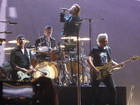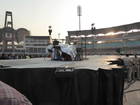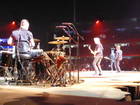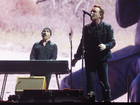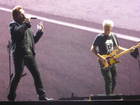U2 Vertigo Tour
Vertigo Tour 1st leg: North America
: San Diego Sports Arena - San Diego, California, USA
U2's Vertigo tour is a whirl of rock 'n' roll passion
(published on 2005-03-30)Source: USA Today
By Edna Gundersen, USA TODAY
SAN DIEGO — On a stage mirroring the target from its Vertigo video, U2 aims high, serving monster hits with vintage rarities and a heavy dose of untested tunes from the current How to Dismantle an Atomic Bomb album.
Bull's-eye.
In a dizzying display of heart and muscle, U2 opened its sold-out Vertigo Tour Monday night before 14,000 fans at San Diego Sports Arena. The two-hour show (* * * * out of four) underscored the band's currency, longevity and 25 years of sustained relevancy, a remarkable accomplishment in this music-industry era of fickle fans and declining fortunes.
At the peak of its powers, U2 is no nostalgia act mining the oldies circuit for boomer bucks. Fresh tunes stirred as much enthusiasm and singalong fervor as the classics (and may prove more durable).
While earlier outings poured on the eye candy, this one scales back the whimsical props and high-tech wizardry to allow more breathing room for the music.
Visuals emphasize color, with shimmering hues and simple images projected on overhead screens and lights that race around an elliptical runway and pulse on a huge beaded curtain.
The concert kicks off with a dramatic City of Blinding Lights and raucous Vertigo, followed by 1980 surprises Cry/Electric Co., An Cat Dubh and Into the Heart, an opening sequence summing the band's journey from the boyish idealism of Boy, U2's debut, to Bomb's struggle to recapture innocence lost.
Emotions run the gamut from giddy on Zoo Station to devastating on Running to Stand Still to ebullient on Beautiful Day. Bono's heart-wrenching vocals turn One and Sometimes You Can't Make It on Your Own into resonating highlights. He's showman and shaman, stalking the catwalk and cueing mood swings, prompting grins with a thrashing drum solo and sending a potent political message minutes later when his headband drops to become a blindfold during Bullet the Blue Sky and a fragment of The Hands That Built America.
Social and humanitarian missives, a staple of U2's catalog, arrive organically in such songs as the still-thrilling Pride (In the Name of Love) and the brash and acidic new Love and Peace or Else. Pointed reminders of the human condition are inserted elsewhere. At one point, the Declaration of Human Rights scrolls across a screen, with portions recited by a narrator. Yet the bulletins serve the music, dovetailing with the sentiments and expanding on the band's longtime commitment to provide more than a party soundtrack to fans. Despite Bono's high-profile activism offstage, his proselytizing is limited to a brief plug for the One campaign to enlist volunteers for African aid.
Though U2's ability to create drama and grandeur is evident, its capacity for sheer wallop is often overlooked. Above all else, this is a sternum-rattling rock show. The locomotive drive and rhythmic interplay of drummer Larry Mullen Jr. and bassist Adam Clayton ensure that the pace never stalls or lapses into metronomic tedium.
And Bono, while never lacking charisma or energy, is often eclipsed by The Edge's majestic guitar, a scene stealer in Vertigo, Miracle Drug, Bullet the Blue Sky and New Year's Day. After defining U2's identity with a spare stutter, he now draws from a staggering range of sonic pigments that evoke passions as mournful, euphoric and furious as anything Bono conjures with language and lungs.
After 21 songs (and scattered segments of Blackbird, I Can See for Miles, When Johnny Comes Marching Home Again and other Bono curveballs), U2 left fans singing its phrases. One by one, the band members exited during 40, leaving the crowd echoing the refrain "How long to sing this song?"
How long will U2 sing its songs? Only as long as their creative fires blaze.
Many artists newly inducted into the Rock and Roll Hall of Fame can (and often do) coast on career-making oldies indefinitely. What this commanding show makes clear is that U2 is a 21st-century band that would rather be in a mausoleum than a museum.
Often plagiarised, never matched.
